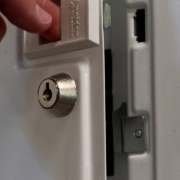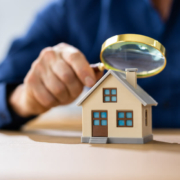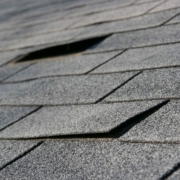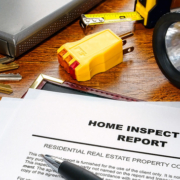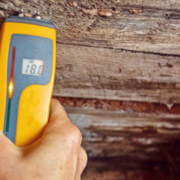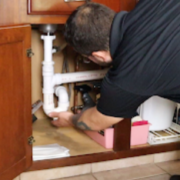When you’re buying a home, there are a lot of steps to complete throughout the process. One of the most crucial steps in the home-buying journey is the home inspection. But, what should you expect from your home inspection?
You can anticipate a thorough assessment of the condition of the home you plan to purchase so you can avoid costly surprises down the road. According to the National Association of Realtors, a home inspection helps a buyer make a more informed decision about the home they are considering buying.
Once your offer is accepted, generally the next step is to have the home inspected. Most real estate agents recommend you make your offer contingent upon a clean home inspection, to protect yourself against buying a home that might have some hidden defects.
This contingency allows you to renegotiate the price you offered for the home, ask the sellers to cover repairs, or in some cases, walk away if you are unable to negotiate a satisfactory resolution to the problems uncovered by the inspection. Your agent can advise you on the best course of action once the report is filed.
In this blog, we’ll take a look at this step in the homeownership journey and give you insight into what you should know about your home inspection and why it’s so important.
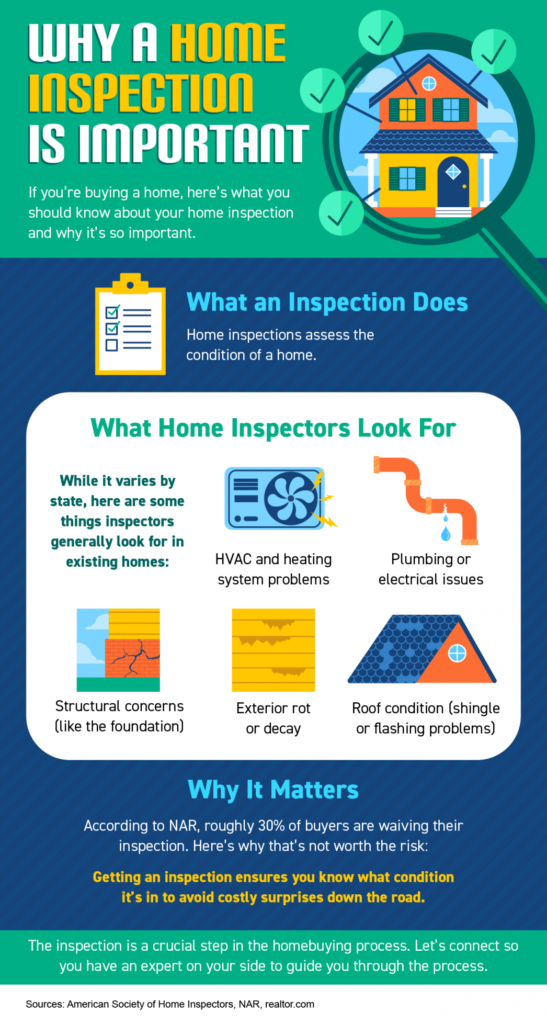
Why is a Home Inspection Important?
The home inspection is important because it gives an impartial evaluation of the home. Think of it as a way to evaluate a home before you buy it. After all, buying a home is a huge investment, and it’s not like you can read Amazon reviews to get a sense of any problems that might crop up after you’ve put down your money for the purchase.
Similar to the appraisal, which determines the current value of the home, the home inspection determines the current condition of the home. As the American Society of Home Inspectors puts it:
“Home inspections are the opportunity to discover major defects that were not apparent at a buyer’s showing. . . Your home inspection is to help you make an informed decision about the house, including its condition.”
Typically, a professional home inspector, certified by the NAHI, is trained to use a home inspection checklist to look at over 1,600 features of your home that can fall into disrepair.
A home inspector uses noninvasive methods to look primarily at the following:
- Grounds for possible water or septic problems
- Structure for foundation, window, or door problems
- Exterior for rot, decay, and excavation problems
- Roof for shingle, flashing, and fascia problems
- Interior for framing, insulation, HVAC, plumbing, and electrical issues
- Kitchen for electrical code compliance, operating cabinets, and plumbing problems
If there are any concerns during the inspection – an aging roof, a malfunctioning HVAC system, or any other questionable items – you have the option to discuss and negotiate any potential issues with the seller. Your real estate advisor can help you navigate this process and negotiate what, if any, repairs need to be made before the sale is finalized.
Keep in mind that home inspections are critical because they can shed light on the challenges you may face as the new homeowner. Without an inspection, serious and sometimes costly issues could come as a surprise later on.
Although you don’t need to be present during the home inspection, it is highly recommended. Many homebuyers find it to be a valuable and worthwhile experience. Being present during the inspection allows you to observe the inspector’s findings and ask questions as they arise. Interacting with the inspector during the inspection can provide homebuyers with invaluable information to help them make informed decisions about their investment.
How to Choose an Inspector
Your real estate agent will most likely have a short list of inspectors they’ve worked with in the past to recommend to you. This is a good place to start. Since you chose your agent based on trust, it’s likely they work with other trustworthy business owners. At the same time, you have the final say on who you choose to perform your home inspection, so do your research.
Realtor.com suggests that you consider the following 5 factors when choosing the right home inspector for you:
- Qualifications – Find out what’s included in your inspection and if the age or location of your home may warrant specific certifications or specialties.
- Sample Reports – Ask for a sample inspection report so you can review how thoroughly they will be inspecting your dream home. In most cases, the more detailed the report, the better.
- References – Do your homework. Ask for phone numbers and names of past clients who you can call to discuss their experiences.
- Memberships – Not all inspectors belong to a national or state association of home inspectors, and membership in one of these groups should not be the only way to evaluate your choice. Membership in one of these organizations does, however, often mean continued training and education are required.
- Errors and Omission Insurance – Find out what the liability of the inspector or inspection company is once the inspection is over. The inspector is only human, after all, and it is possible they might miss something they should see.
What Happens During a Home Inspection?
Home inspectors are looking for plumbing or electrical issues, roof condition, exterior rot or decay, HVAC and heating or cooling system problems, structural and foundation concerts, safety concerns, and any other visible defects that could pose a problem.
Don’t be surprised to see your inspector climbing on the roof or crawling around in the attic and on the floors. The inspector’s job is to protect your investment and find any issues with the home, including but not limited to the roof, plumbing, electrical components, appliances, heating and air conditioning systems, ventilation, windows, fireplace and chimney, foundation, and so much more.
Other Reasons to Get a Home Inspection
Home inspections are a must when buying or selling a house. However, there are plenty of reasons to hire a qualified home inspector, even if you aren’t planning on buying or selling soon. Maybe you want the peace of mind of knowing that all systems are working as they should, or simply that the major rainstorm last month didn’t cause any hidden leaks.
Many experts recommend having your home professionally inspected every two to five years. Here are six money-saving reasons why this is a good idea:
Bottom Line
They say ‘ignorance is bliss,’ but not when investing your hard-earned money into a home of your own, or wanting to keep your current home in tip-top condition. Completing a home inspection is a vital part of your homeownership journey, so be sure to choose a professional that will give you a thorough and complete picture of the condition of the house.
Working with a professional you can trust, like CMS Home Inspection, will give you the most information possible, so you can make the most educated decision about your purchase. Our business is built on trust, integrity, and ensuring you have the information you need about one of the largest investments you’ll make.
Ultimately, a thorough home inspection depends heavily on experience and attention to detail. With CMS Home Inspection, you are getting a Certified and Licensed Inspector who understands the commitment you are about to make. When you hire us to inspect your new home, we guarantee that we will take the same care as if it was our own home.
CMS Home Inspection is committed to serving you, our customer. Choosing the right home inspector can help ease your stress and give you peace of mind. We will help you make sure your investment is secure. Let’s connect if you have questions or want to schedule a home inspection.

